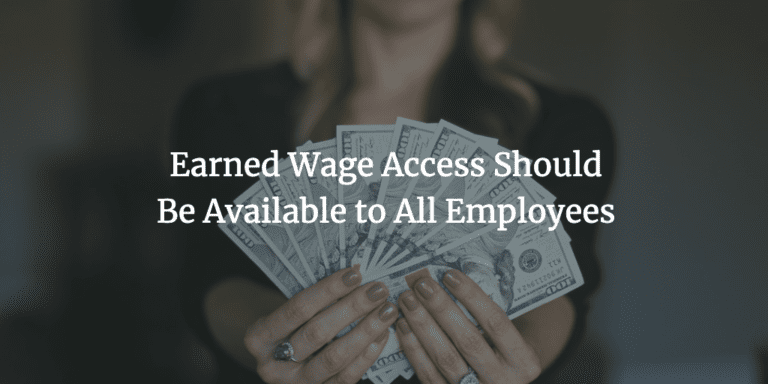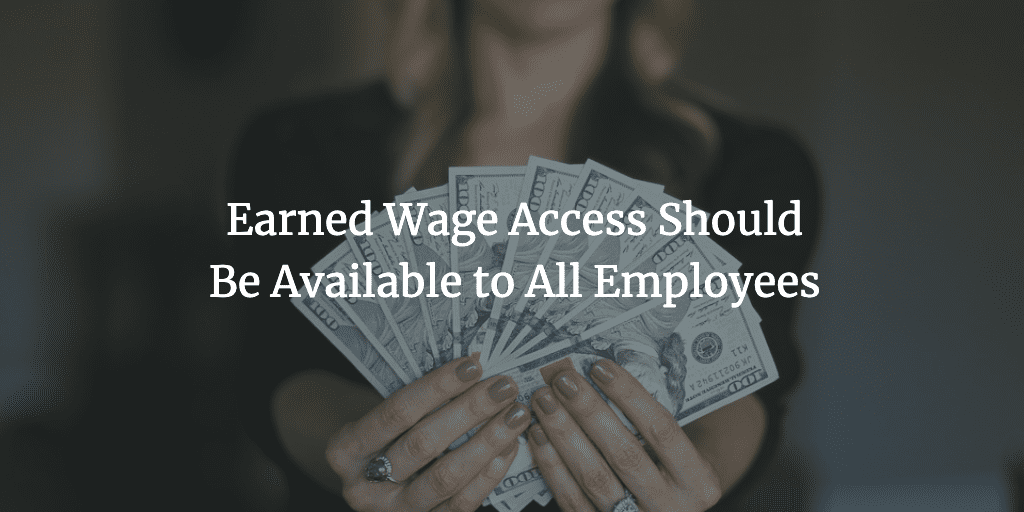Like many areas of fintech, earned wage access (sometimes called earned income access or payroll advances) wasn’t really a thing until recently. Now, it is a thriving niche industry with companies such as PayActiv, Earnin, Even, DailyPay, HoneyBee and others providing offerings in this space.
In a sign that earned wage access is gaining mainstream approval Walmart signed a deal with PayActiv and Even back in 2017 to allow its workers early access to their pay. Currently over 300,000 Walmart associates take advantage of this service.
Before we go any further, I should define earned wage access. It is a mechanism for employees to get access to wages they have already earned. It breaks up the weekly, biweekly, or monthly pay cycles so workers can receive money that is rightfully theirs before payday. Typically, workers will pay a small fee for this service. Earned wage access is not credit and thus it has very little in common with traditional loan products.
Dan Quan, former head of innovation at the CFPB penned an excellent article on this topic in American Banker a couple of months ago. Here is a quote from that article (he calls it Earned Income Access – or EIA):
For the first time, there is a viable market solution that has the promise of significantly lowering the cost of helping consumers manage short term cash flow needs and improving their financial lives. Opposing EIA, especially efforts to ban the direct-to-consumer model, would be detrimental to consumers and small businesses.
I would also encourage interested readers to listen to the panel session at LendIt Fintech on this topic earlier this year that featured several of the aforementioned companies.
Let’s be under no illusions here. Earned wage access won’t be a panacea for those people living paycheck to paycheck but it will help them avoid costly overdrafts and payday lending fees. American consumers spend many billions on overdrafts every year, money they can ill afford to spend. One of the ways we can address this problem is through earned wage access.
Applying APRs to This Product is Ridiculous
I want to get one thing out of the way. It makes no sense to even talk about annual percentage rates (APRs) when looking at earned wage access. Here is a quick example to illustrate this. Let’s say an employee needs to take out a $200 advance on their wages seven days before payday. The cost for this advance is $5. If you calculate the APR on this transaction it comes out to 130%. That is a number that regulators can get very upset about. But who in their right mind could think that the above situation takes advantage of the worker? They are out only $5 and there are no other fees that the worker needs to worry about. And there is no possibility of rolling over this amount because it is not a loan.
Of course, you need to put guardrails in place. You want to make sure that employees don’t take a big chunk of their wages early. You also want to ensure that workers don’t use this service for every paycheck but have limits in place so it is available as a safety net not as a new regular paycheck. There should also be limits on fees, as well, so companies cannot charge exorbitant fees like in the payday loan industry.
Regulators are Getting Involved
Many of these issues are being debated in California right now. There is a bill working its way through the legislature in California this summer (SB-472). It has already passed the Senate in a unanimous vote and is being amended in the Assembly right now. Interestingly, this bill was sponsored by PayActiv who has become very active (no pun intended) in working with regulators to bring some commonsense regulation to this new industry.
Speaking of regulators, the New York Department of Financial Services have started an investigation into this industry. It was this action that actually prompted me to write this article because I think the worst outcome for consumers will be overreach by regulators in the name of consumer protection. Ballard Spahr has the details of this action taken by the NYDFS and other state regulators.
We live in an on-demand world today where consumers have instant access to information and services that would have been unimaginable just a couple of decades ago. Yet the way we pay our workers has not changed much in the last hundred years. Many gig economy workers such as Uber and Lyft drivers can get access to their pay as they earn it. Maybe that is where we are headed for all workers in the future.
For today, what would make a real difference for consumers is for them to have more control over their finances. Roughly half the population live paycheck to paycheck so even a $250 surprise expense can send them running to the nearest payday loan store. A better solution would be for these people to be able to tap into the money they have already earned. This can save them hundreds or even thousands of dollars a year in unnecessary finance charges.



